Презентация us foreign policy

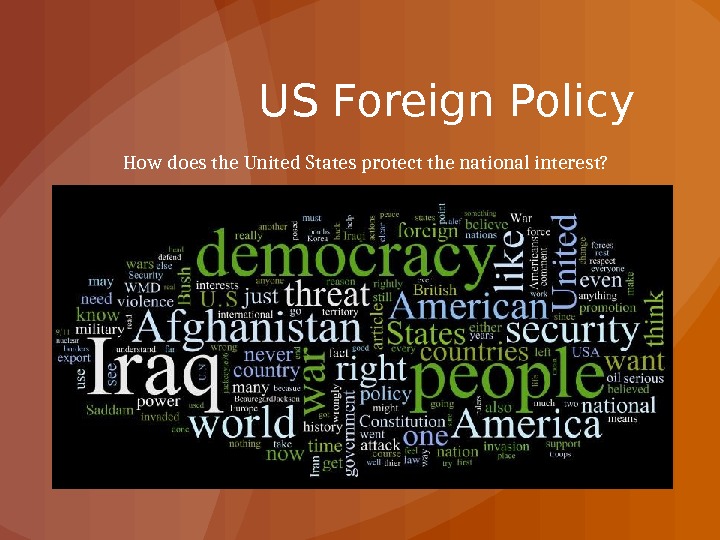
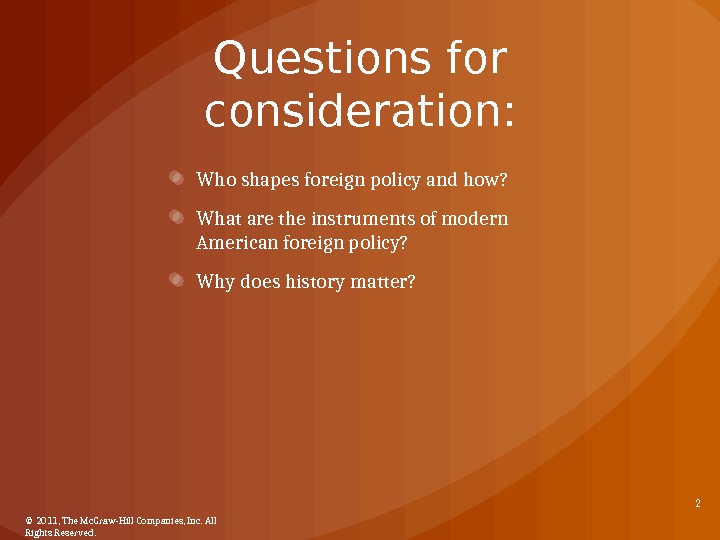
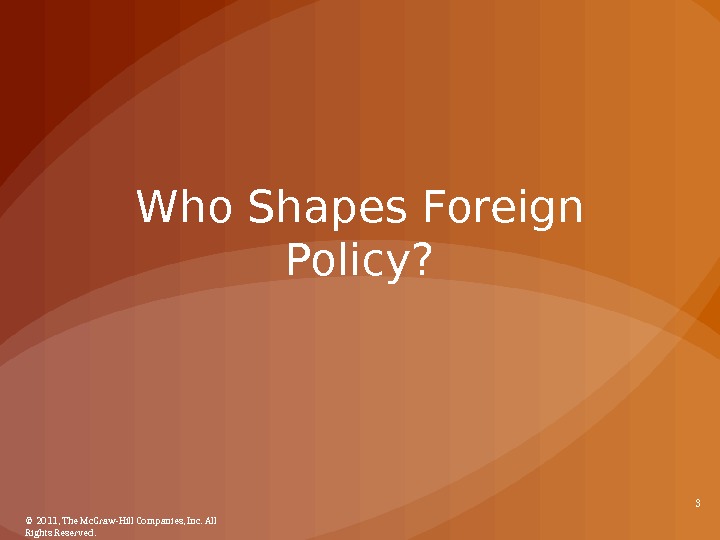
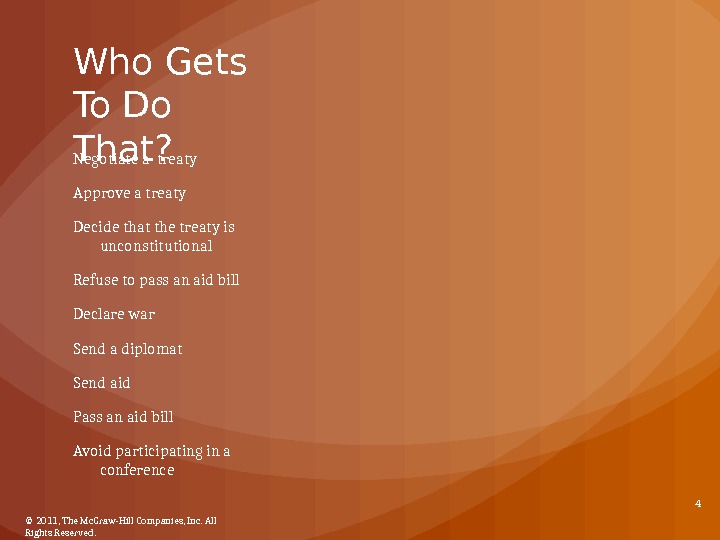
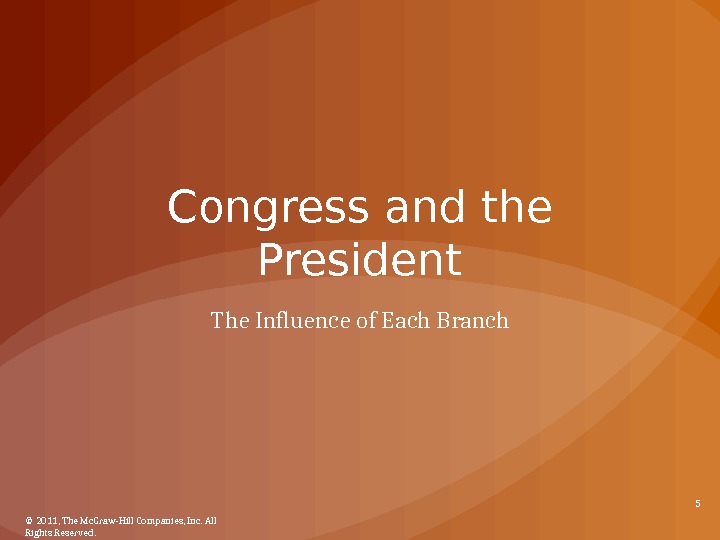
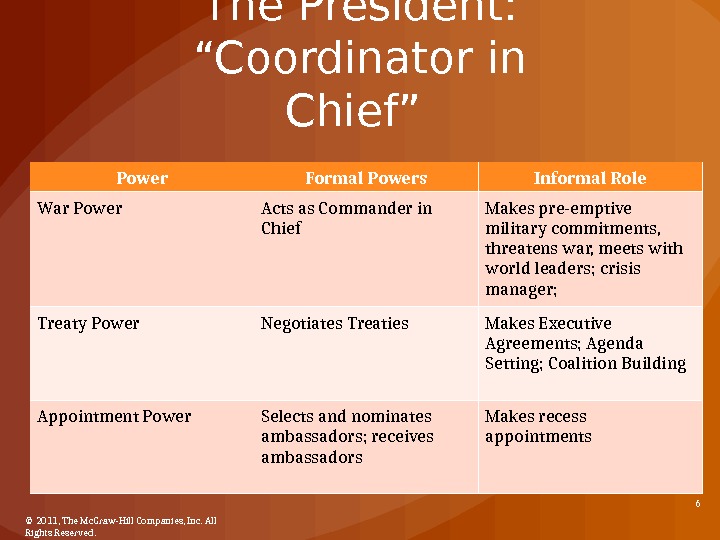
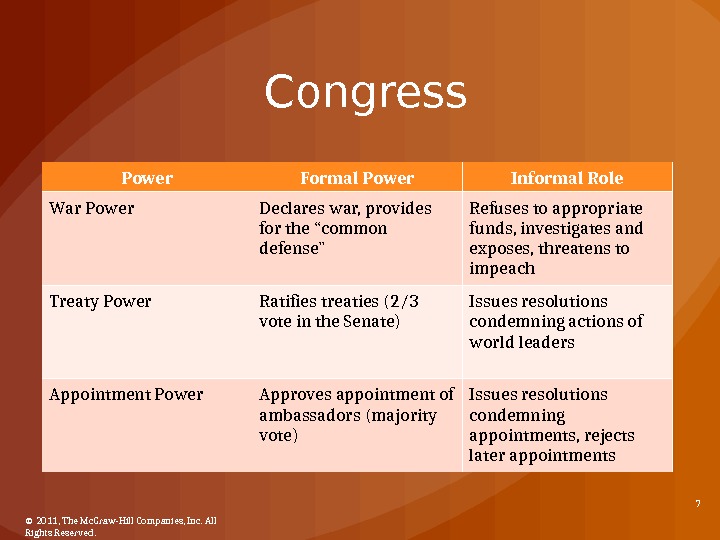
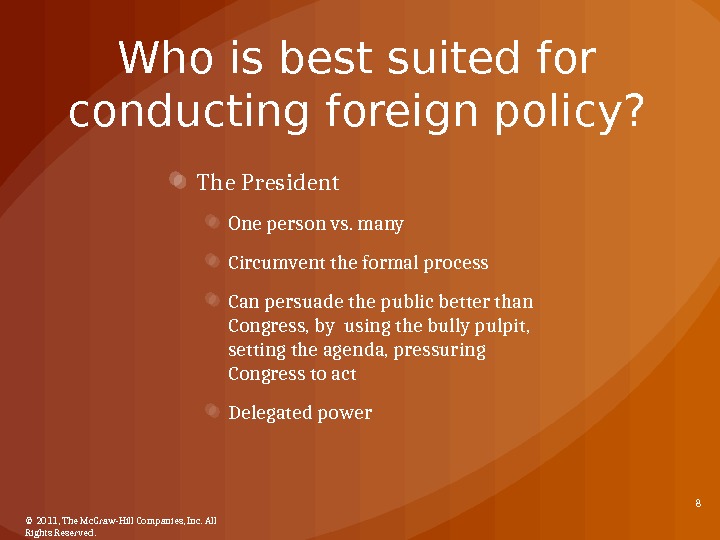
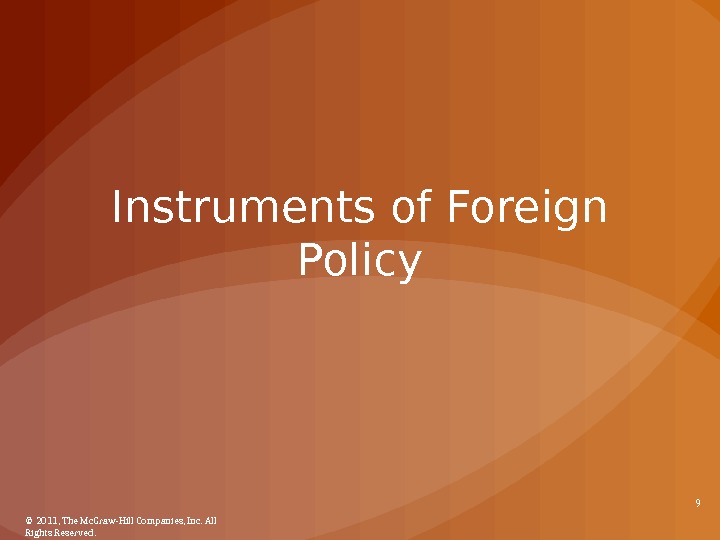
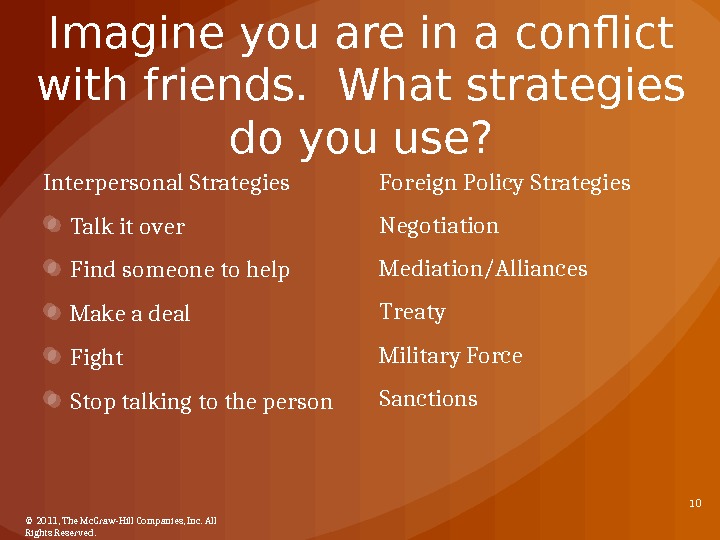
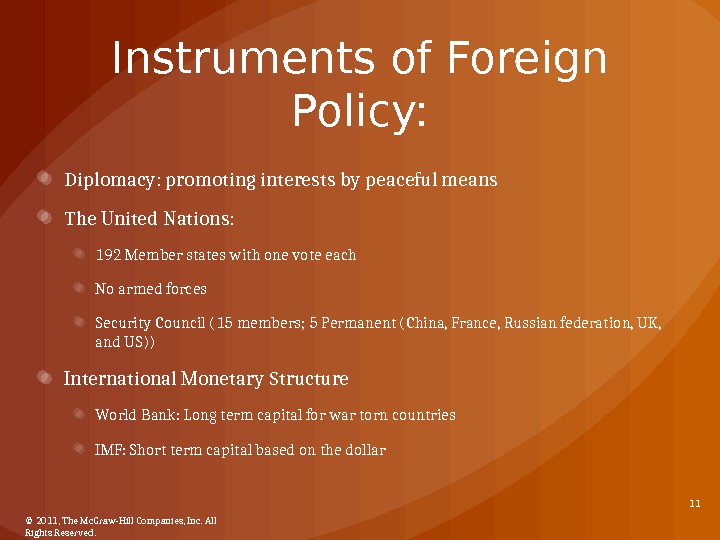
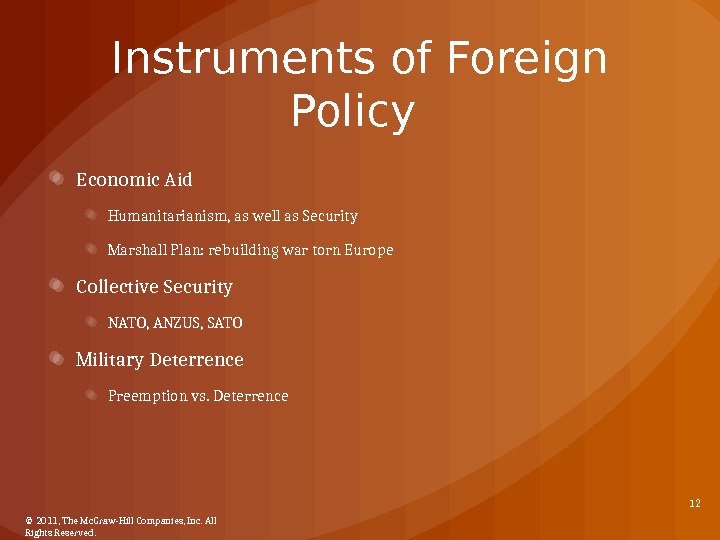
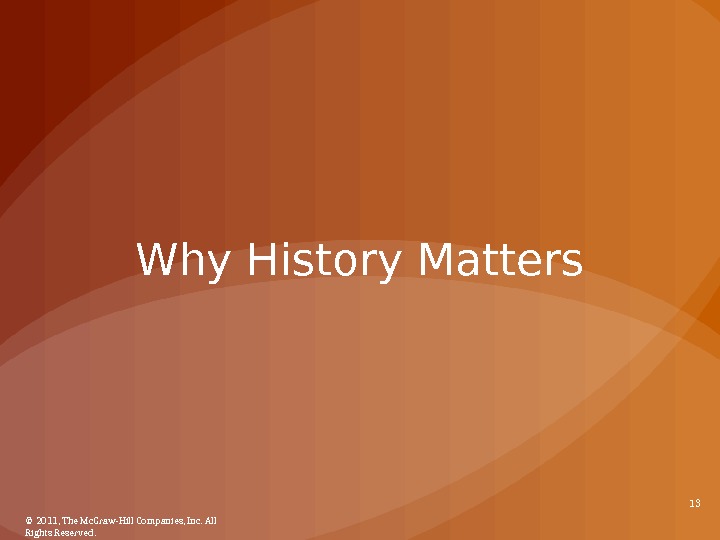
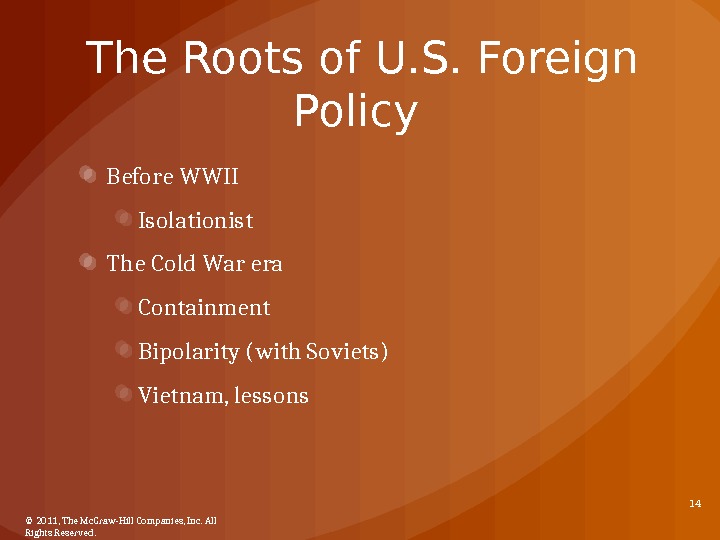
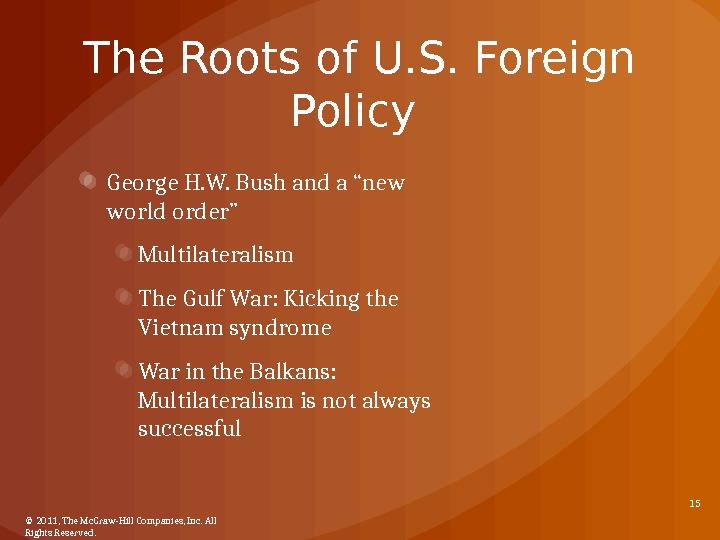
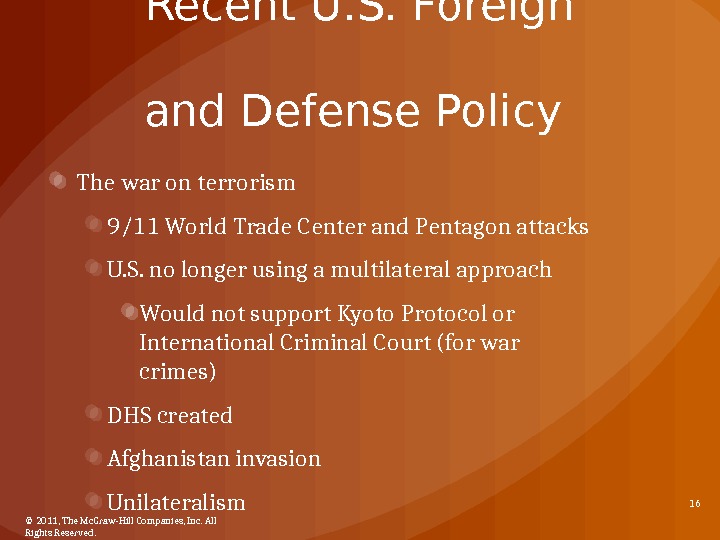
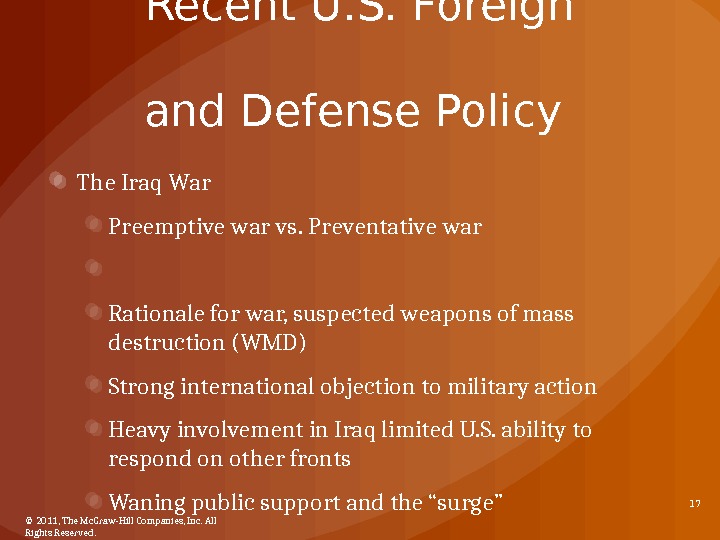
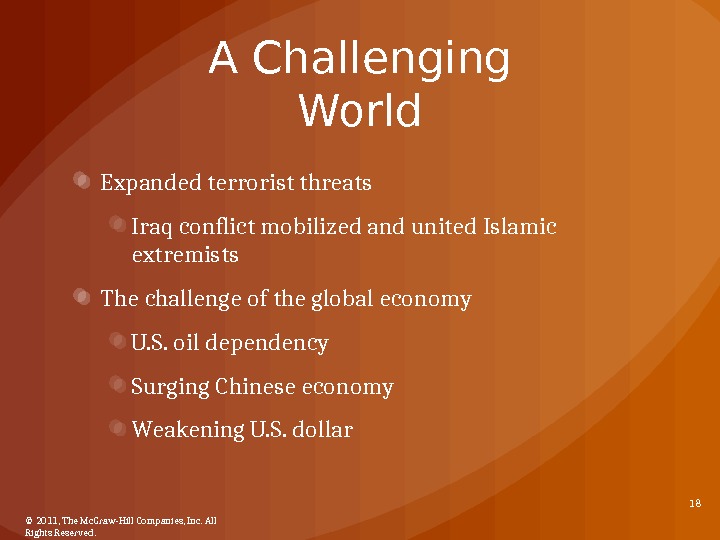


- Размер: 855.5 Кб
- Количество слайдов: 20
Описание презентации Презентация us foreign policy по слайдам
 Click to edit Master subtitle style US Foreign Policy How does the United States protect the national interest?
Click to edit Master subtitle style US Foreign Policy How does the United States protect the national interest?
 Questions for consideration: Who shapes foreign policy and how? What are the instruments of modern American foreign policy? Why does history matter? © 2011, The Mc. Graw-Hill Companies, Inc. All Rights Reserved.
Questions for consideration: Who shapes foreign policy and how? What are the instruments of modern American foreign policy? Why does history matter? © 2011, The Mc. Graw-Hill Companies, Inc. All Rights Reserved.
 Who Shapes Foreign Policy? © 2011, The Mc. Graw-Hill Companies, Inc. All Rights Reserved.
Who Shapes Foreign Policy? © 2011, The Mc. Graw-Hill Companies, Inc. All Rights Reserved.
 Who Gets To Do That? Negotiate a treaty Approve a treaty Decide that the treaty is unconstitutional Refuse to pass an aid bill Declare war Send a diplomat Send aid Pass an aid bill Avoid participating in a conference © 2011, The Mc. Graw-Hill Companies, Inc. All Rights Reserved.
Who Gets To Do That? Negotiate a treaty Approve a treaty Decide that the treaty is unconstitutional Refuse to pass an aid bill Declare war Send a diplomat Send aid Pass an aid bill Avoid participating in a conference © 2011, The Mc. Graw-Hill Companies, Inc. All Rights Reserved.
 Congress and the President The Influence of Each Branch © 2011, The Mc. Graw-Hill Companies, Inc. All Rights Reserved.
Congress and the President The Influence of Each Branch © 2011, The Mc. Graw-Hill Companies, Inc. All Rights Reserved.
 The President: “Coordinator in Chief” Power Formal Powers Informal Role War Power Acts as Commander in Chief Makes pre-emptive military commitments, threatens war, meets with world leaders; crisis manager; Treaty Power Negotiates Treaties Makes Executive Agreements; Agenda Setting; Coalition Building Appointment Power Selects and nominates ambassadors; receives ambassadors Makes recess appointments © 2011, The Mc. Graw-Hill Companies, Inc. All Rights Reserved.
The President: “Coordinator in Chief” Power Formal Powers Informal Role War Power Acts as Commander in Chief Makes pre-emptive military commitments, threatens war, meets with world leaders; crisis manager; Treaty Power Negotiates Treaties Makes Executive Agreements; Agenda Setting; Coalition Building Appointment Power Selects and nominates ambassadors; receives ambassadors Makes recess appointments © 2011, The Mc. Graw-Hill Companies, Inc. All Rights Reserved.
 Congress Power Formal Power Informal Role War Power Declares war, provides for the “common defense” Refuses to appropriate funds, investigates and exposes, threatens to impeach Treaty Power Ratifies treaties (2/3 vote in the Senate) Issues resolutions condemning actions of world leaders Appointment Power Approves appointment of ambassadors (majority vote) Issues resolutions condemning appointments, rejects later appointments © 2011, The Mc. Graw-Hill Companies, Inc. All Rights Reserved.
Congress Power Formal Power Informal Role War Power Declares war, provides for the “common defense” Refuses to appropriate funds, investigates and exposes, threatens to impeach Treaty Power Ratifies treaties (2/3 vote in the Senate) Issues resolutions condemning actions of world leaders Appointment Power Approves appointment of ambassadors (majority vote) Issues resolutions condemning appointments, rejects later appointments © 2011, The Mc. Graw-Hill Companies, Inc. All Rights Reserved.
 Who is best suited for conducting foreign policy? The President One person vs. many Circumvent the formal process Can persuade the public better than Congress, by using the bully pulpit, setting the agenda, pressuring Congress to act Delegated power © 2011, The Mc. Graw-Hill Companies, Inc. All Rights Reserved.
Who is best suited for conducting foreign policy? The President One person vs. many Circumvent the formal process Can persuade the public better than Congress, by using the bully pulpit, setting the agenda, pressuring Congress to act Delegated power © 2011, The Mc. Graw-Hill Companies, Inc. All Rights Reserved.
 Instruments of Foreign Policy © 2011, The Mc. Graw-Hill Companies, Inc. All Rights Reserved.
Instruments of Foreign Policy © 2011, The Mc. Graw-Hill Companies, Inc. All Rights Reserved.
 Imagine you are in a conflict with friends. What strategies do you use? Interpersonal Strategies Talk it over Find someone to help Make a deal Fight Stop talking to the person Foreign Policy Strategies Negotiation Mediation/Alliances Treaty Military Force Sanctions © 2011, The Mc. Graw-Hill Companies, Inc. All Rights Reserved.
Imagine you are in a conflict with friends. What strategies do you use? Interpersonal Strategies Talk it over Find someone to help Make a deal Fight Stop talking to the person Foreign Policy Strategies Negotiation Mediation/Alliances Treaty Military Force Sanctions © 2011, The Mc. Graw-Hill Companies, Inc. All Rights Reserved.
 Instruments of Foreign Policy: Diplomacy: promoting interests by peaceful means The United Nations: 192 Member states with one vote each No armed forces Security Council (15 members; 5 Permanent (China, France, Russian federation, UK, and US)) International Monetary Structure World Bank: Long term capital for war torn countries IMF: Short term capital based on the dollar © 2011, The Mc. Graw-Hill Companies, Inc. All Rights Reserved.
Instruments of Foreign Policy: Diplomacy: promoting interests by peaceful means The United Nations: 192 Member states with one vote each No armed forces Security Council (15 members; 5 Permanent (China, France, Russian federation, UK, and US)) International Monetary Structure World Bank: Long term capital for war torn countries IMF: Short term capital based on the dollar © 2011, The Mc. Graw-Hill Companies, Inc. All Rights Reserved.
 Instruments of Foreign Policy Economic Aid Humanitarianism, as well as Security Marshall Plan: rebuilding war torn Europe Collective Security NATO, ANZUS, SATO Military Deterrence Preemption vs. Deterrence © 2011, The Mc. Graw-Hill Companies, Inc. All Rights Reserved.
Instruments of Foreign Policy Economic Aid Humanitarianism, as well as Security Marshall Plan: rebuilding war torn Europe Collective Security NATO, ANZUS, SATO Military Deterrence Preemption vs. Deterrence © 2011, The Mc. Graw-Hill Companies, Inc. All Rights Reserved.
 Why History Matters © 2011, The Mc. Graw-Hill Companies, Inc. All Rights Reserved.
Why History Matters © 2011, The Mc. Graw-Hill Companies, Inc. All Rights Reserved.
 The Roots of U. S. Foreign Policy Before WWII Isolationist The Cold War era Containment Bipolarity (with Soviets) Vietnam, lessons © 2011, The Mc. Graw-Hill Companies, Inc. All Rights Reserved.
The Roots of U. S. Foreign Policy Before WWII Isolationist The Cold War era Containment Bipolarity (with Soviets) Vietnam, lessons © 2011, The Mc. Graw-Hill Companies, Inc. All Rights Reserved.
 The Roots of U. S. Foreign Policy George H. W. Bush and a “new world order” Multilateralism The Gulf War: Kicking the Vietnam syndrome War in the Balkans: Multilateralism is not always successful © 2011, The Mc. Graw-Hill Companies, Inc. All Rights Reserved.
The Roots of U. S. Foreign Policy George H. W. Bush and a “new world order” Multilateralism The Gulf War: Kicking the Vietnam syndrome War in the Balkans: Multilateralism is not always successful © 2011, The Mc. Graw-Hill Companies, Inc. All Rights Reserved.
 Recent U. S. Foreign and Defense Policy The war on terrorism 9/11 World Trade Center and Pentagon attacks U. S. no longer using a multilateral approach Would not support Kyoto Protocol or International Criminal Court (for war crimes) DHS created Afghanistan invasion Unilateralism © 2011, The Mc. Graw-Hill Companies, Inc. All Rights Reserved.
Recent U. S. Foreign and Defense Policy The war on terrorism 9/11 World Trade Center and Pentagon attacks U. S. no longer using a multilateral approach Would not support Kyoto Protocol or International Criminal Court (for war crimes) DHS created Afghanistan invasion Unilateralism © 2011, The Mc. Graw-Hill Companies, Inc. All Rights Reserved.
 Recent U. S. Foreign and Defense Policy The Iraq War Preemptive war vs. Preventative war Rationale for war, suspected weapons of mass destruction (WMD) Strong international objection to military action Heavy involvement in Iraq limited U. S. ability to respond on other fronts Waning public support and the “surge” © 2011, The Mc. Graw-Hill Companies, Inc. All Rights Reserved.
Recent U. S. Foreign and Defense Policy The Iraq War Preemptive war vs. Preventative war Rationale for war, suspected weapons of mass destruction (WMD) Strong international objection to military action Heavy involvement in Iraq limited U. S. ability to respond on other fronts Waning public support and the “surge” © 2011, The Mc. Graw-Hill Companies, Inc. All Rights Reserved.
 A Challenging World Expanded terrorist threats Iraq conflict mobilized and united Islamic extremists The challenge of the global economy U. S. oil dependency Surging Chinese economy Weakening U. S. dollar © 2011, The Mc. Graw-Hill Companies, Inc. All Rights Reserved.
A Challenging World Expanded terrorist threats Iraq conflict mobilized and united Islamic extremists The challenge of the global economy U. S. oil dependency Surging Chinese economy Weakening U. S. dollar © 2011, The Mc. Graw-Hill Companies, Inc. All Rights Reserved.
 Obama and Foreign Policy Afghanistan Iraq North Korea Iran Arab Spring © 2011, The Mc. Graw-Hill Companies, Inc. All Rights Reserved.
Obama and Foreign Policy Afghanistan Iraq North Korea Iran Arab Spring © 2011, The Mc. Graw-Hill Companies, Inc. All Rights Reserved.
 Thanks for attention © 2011, The Mc. Graw-Hill Companies, Inc. All Rights Reserved.
Thanks for attention © 2011, The Mc. Graw-Hill Companies, Inc. All Rights Reserved.

